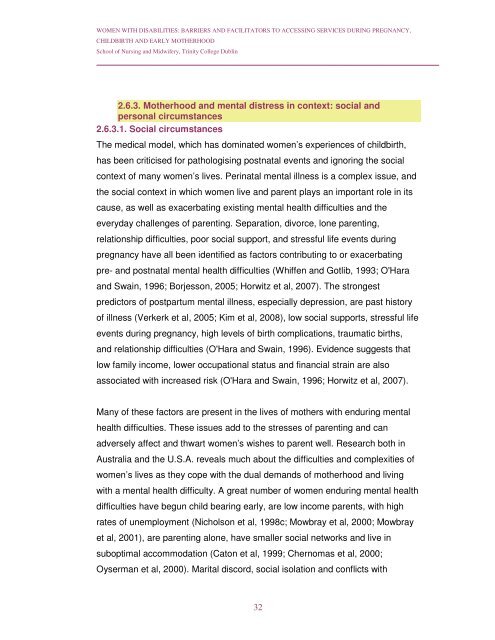Women with Disabilities: Barriers and Facilitators to Accessing ...
Women with Disabilities: Barriers and Facilitators to Accessing ...
Women with Disabilities: Barriers and Facilitators to Accessing ...
Create successful ePaper yourself
Turn your PDF publications into a flip-book with our unique Google optimized e-Paper software.
WOMEN WITH DISABILITIES: BARRIERS AND FACILITATORS TO ACCESSING SERVICES DURING PREGNANCY,CHILDBIRTH AND EARLY MOTHERHOODSchool of Nursing <strong>and</strong> Midwifery, Trinity College Dublin2.6.3. Motherhood <strong>and</strong> mental distress in context: social <strong>and</strong>personal circumstances2.6.3.1. Social circumstancesThe medical model, which has dominated women’s experiences of childbirth,has been criticised for pathologising postnatal events <strong>and</strong> ignoring the socialcontext of many women’s lives. Perinatal mental illness is a complex issue, <strong>and</strong>the social context in which women live <strong>and</strong> parent plays an important role in itscause, as well as exacerbating existing mental health difficulties <strong>and</strong> theeveryday challenges of parenting. Separation, divorce, lone parenting,relationship difficulties, poor social support, <strong>and</strong> stressful life events duringpregnancy have all been identified as fac<strong>to</strong>rs contributing <strong>to</strong> or exacerbatingpre- <strong>and</strong> postnatal mental health difficulties (Whiffen <strong>and</strong> Gotlib, 1993; O'Hara<strong>and</strong> Swain, 1996; Borjesson, 2005; Horwitz et al, 2007). The strongestpredic<strong>to</strong>rs of postpartum mental illness, especially depression, are past his<strong>to</strong>ryof illness (Verkerk et al, 2005; Kim et al, 2008), low social supports, stressful lifeevents during pregnancy, high levels of birth complications, traumatic births,<strong>and</strong> relationship difficulties (O'Hara <strong>and</strong> Swain, 1996). Evidence suggests thatlow family income, lower occupational status <strong>and</strong> financial strain are alsoassociated <strong>with</strong> increased risk (O'Hara <strong>and</strong> Swain, 1996; Horwitz et al, 2007).Many of these fac<strong>to</strong>rs are present in the lives of mothers <strong>with</strong> enduring mentalhealth difficulties. These issues add <strong>to</strong> the stresses of parenting <strong>and</strong> canadversely affect <strong>and</strong> thwart women’s wishes <strong>to</strong> parent well. Research both inAustralia <strong>and</strong> the U.S.A. reveals much about the difficulties <strong>and</strong> complexities ofwomen’s lives as they cope <strong>with</strong> the dual dem<strong>and</strong>s of motherhood <strong>and</strong> living<strong>with</strong> a mental health difficulty. A great number of women enduring mental healthdifficulties have begun child bearing early, are low income parents, <strong>with</strong> highrates of unemployment (Nicholson et al, 1998c; Mowbray et al, 2000; Mowbrayet al, 2001), are parenting alone, have smaller social networks <strong>and</strong> live insuboptimal accommodation (Ca<strong>to</strong>n et al, 1999; Chernomas et al, 2000;Oyserman et al, 2000). Marital discord, social isolation <strong>and</strong> conflicts <strong>with</strong>32
















